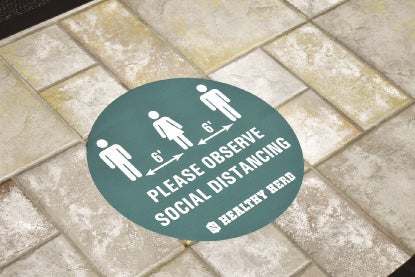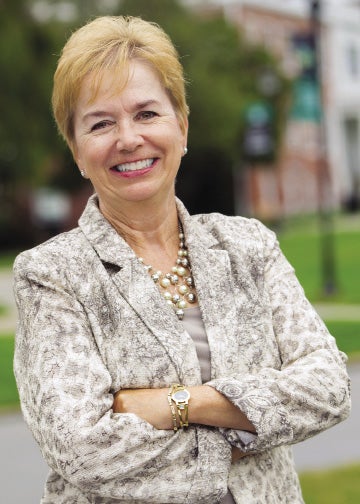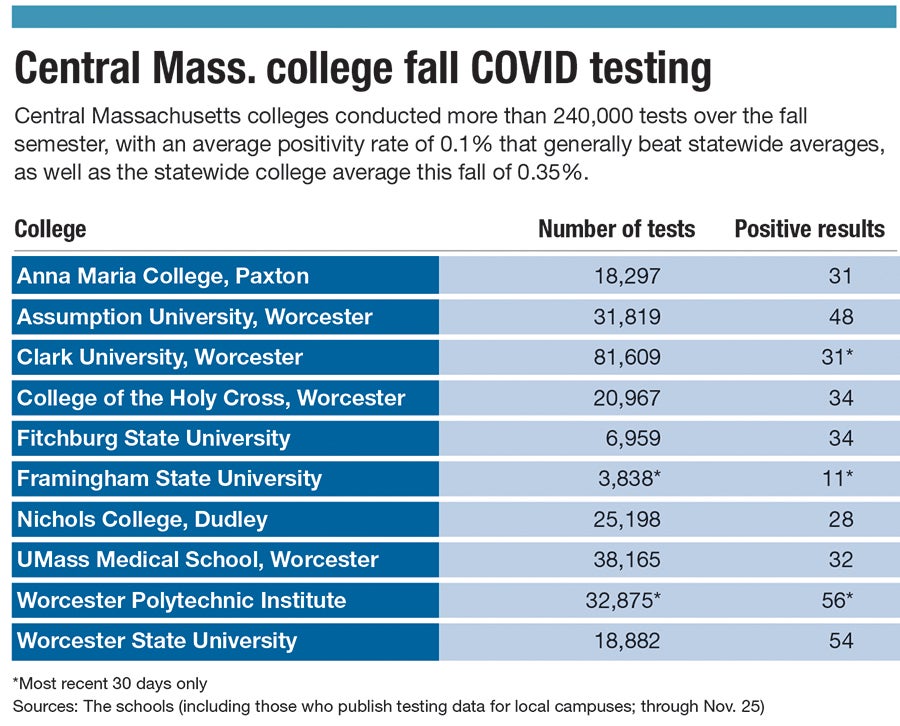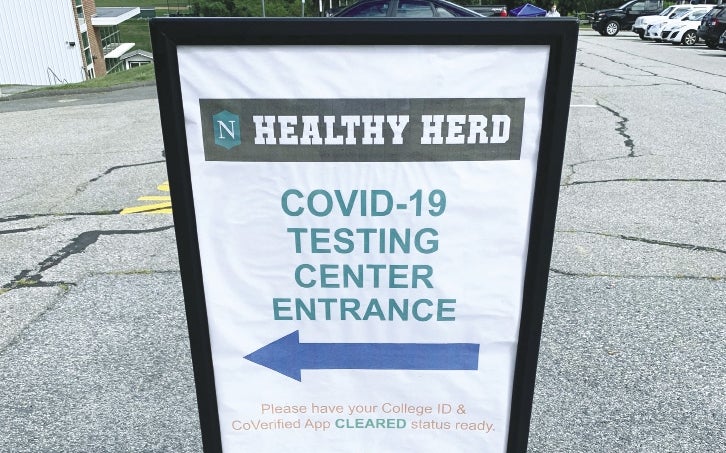Signs around the Nichols College campus in Dudley this fall urged students to “Keep the Herd Healthy” or “Keep One Bison Apart.”The signs, a take on the school’s Bisons nickname for athletics, was a somewhat lighthearted and clever way of reminding students to keep health and safety in mind during the coronavirus pandemic. But they […]
Get Instant Access to This Article
Subscribe to Worcester Business Journal and get immediate access to all of our subscriber-only content and much more.
- Critical Central Massachusetts business news updated daily.
- Immediate access to all subscriber-only content on our website.
- Bi-weekly print or digital editions of our award-winning publication.
- Special bonus issues like the WBJ Book of Lists.
- Exclusive ticket prize draws for our in-person events.
Click here to purchase a paywall bypass link for this article.
Signs around the Nichols College campus in Dudley this fall urged students to “Keep the Herd Healthy” or “Keep One Bison Apart.”
The signs, a take on the school’s Bisons nickname for athletics, was a somewhat lighthearted and clever way of reminding students to keep health and safety in mind during the coronavirus pandemic. But they in no way indicate the lengths to which the Nichols administration went to keep the campus safe this fall.

From August through late November, Nichols conducted more than 25,000 tests and had 28 come back positive – a rate of 0.1%. As the semester went on and other schools began moving courses online or restricting the movement of students – a list including Assumption and Clark universities, Worcester Polytechnic Institute, Worcester State University and Fitchburg State University – Nichols made it to its Thanksgiving break able to look back and exhale a bit that all the precautions largely worked.
“That was remarkable that we were able to be a part of that,” President Susan West Engelkemeyer said.
Nichols benefited from a few factors working in its favor: a small, rural campus, a student body largely hailing from Massachusetts and nearby states with low virus numbers heading into the semester, and a dedicated testing program college leaders said was the backbone of keeping the school healthy.

Months of preparation
Nichols, along with counterparts virtually everywhere, was forced to abandon plans for finishing the spring semester on campus and capping it with a commencement ceremony once the pandemic hit. It wasn’t long after that school officials already began looking at how the fall semester may look.
In May, Gov. Charlie Baker indicated colleges’ fall operations were included in the state’s plans for a gradual reopening after a spring surge in coronavirus cases. It was then Nichols assembled task forces to look at nearly every aspect of operations on campus. One focused on academic engagement and classroom use, another on dorms and dining services, and one focused on personnel and another on athletics, including the campus fitness center.
A list of factors to consider spanned more than 100 items.
“There isn’t a single element of the built environment that wasn’t affected,” said Bob LaVigne, Nichols’ vice president for operations.
Nichols turned off hand dryers in restrooms and replaced them with paper towel dispensers not moving the air around so much. It spaced out dining hall tables and classroom desks and placed hand sanitizer stations seemingly everywhere. Each classroom was stocked with disinfectant spray and paper towels for students to wipe down their desks before class.
Heating, air conditioning and ventilation systems were tweaked so instead of circulating air only when needed – something normal times would be ideal for conserving electricity – to bring in as much fresh air as possible. Older buildings with dated HVAC systems weren’t used at all.
“The list just goes on and on and on,” LaVigne said.
Safety measures on campus started proving useful weeks before classes even began. Nichols had some students arrive a few weeks earlier than normal to drop off their stuff and return home so when they arrived for the start of the semester, they wouldn’t need family and a car packed with belongings and decor in tow.

Crediting students
Engelkemeyer and LaVigne lauded one group in particular for making the semester a success: students.
“We really owe it to the students for taking it so seriously,” said Engelkemeyer, who will retire after the spring semester after a decade leading the school.
Students were required to show up in the fall showing a recent negative test result. They then entered the school’s own strict testing regimen, including twice-a-week tests for residential students and student athletes, whose games were called off but whose practices and training continued.
“For our student athletes, it’s a very big part of their lives,” Engelkemeyer said.
Nichols wanted to let student athletes continue to work with their teammates, so they phased in practices and training starting in small groups. Eventually, three athletes tested positive, but later tests of teammates were negative.
Others were tested, too, including faculty and staff, and even third-party vendors such as cleaning companies and public safety. In all, the school spent nearly $1 million over the semester on tests.
“But we knew that was an investment we had to make to make sure we were keeping students and the community safe,” Engelkemeyer said.
Students living on campus were given a bit more room, with nearly 700 living on campus compared to the usual 1,000. The school even gave a small financial incentive of $500 to students to commute to campus instead, with much of the rest of residential students living in suites, doubles or triples with their own bathrooms – not the big restrooms and shower areas serving a whole floor in older housing.
Roughly one in five Nichols students commuted to campus previously, making the transition a bit easier. They tend to be more local, primarily from Massachusetts and other New England states with generally tighter restrictions and lower case rates before the semester began. A rural location in Dudley, which remains at low case levels, helped insulate the campus a bit from areas with higher transmission rates.
“We tried to create a bubble as much as possible,” Engelkemeyer said.
It largely worked. Nichols once went seven weeks without a single positive test result.
Nichols is ending the fall semester with students finishing their courses and taking finals remotely. In one last safety measure, students were urged to return home for the holidays and winter break with a negative test.
As for the spring semester, it’ll start on Feb. 1, a few weeks later than normal in hopes of avoiding the worst of a winter wave of cases. Testing is planned to pick back up again, and most classes will involve a mix of in-person and online components.
There will be one change: Students said they hoped to take more classes in person, so more will be offered exclusively on campus for the spring. For students, those classes will be optional.

